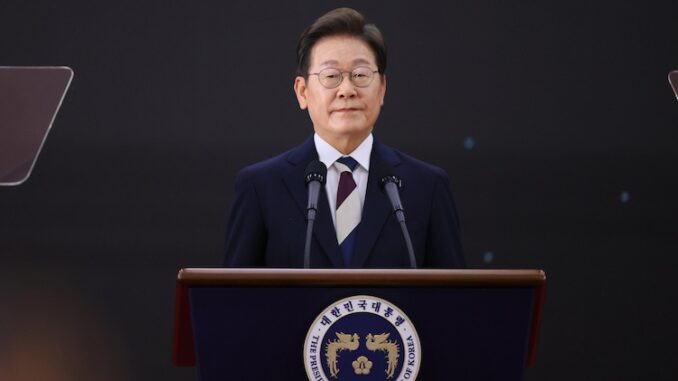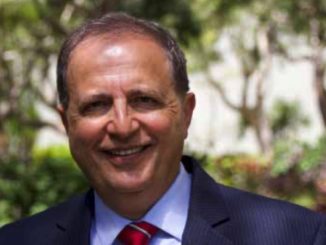
New president Lee Jae-myung sees the need for strengthened relations between Pyongyang and Seoul, but the United States and Japan continue to play a critical deterrence role, writes international security specialist Debalina Ghoshal.
In June 2025, the Republic of Korea (ROK) witnessed the snap election of its fourteenth President, the Democratic Party of Korea’s (DPK) Lee Jae-myung, following the impeachment of incumbent president Yoon Suk Yeol.
The new president has several domestic challenges to overcome, including political and economic shocks. Lee will also have to ensure that South Korea’s relations with North Korea are normalised – a major foreign policy task that will put his diplomacy skills to the test.
Prior to Yoon Suk Yeol, the then president Moon Jae-in ensured that Seoul’s relations with Pyongyang were strengthened This had the result in 2017 of North Korea announcing a self-imposed moratorium on its nuclear and missile tests. Nevertheless, amid cooling relations between North Korean leader Kim Jong-un and Yoon, Pyongyang announced in 2022 the possibility it could move away from the moratorium citing apparent military provocations from the South.
“Given the ruling Democratic Party of Korea holds a majority, they are unlikely to face any challenges on decisions relating to foreign policy objectives.”
Pyongyang, which had closed tunnels in its nuclear site in 2018, then commenced work to restore them. It also conducted tests of nuclear capable missiles – reactions to the hawkish policies of a Yoon government adamant on strengthening military ties with the United States through the conduct of military exercises.
Nevertheless, the new president is keen to improve Seoul’s relations with Pyongyang and also resolve the nuclear conundrum through an open “communication channel with North Korea” and establish peace on the Korean Peninsula through “talks and cooperation”.
Balanced approach needed
While campaigning, Lee had laid stress on co-prosperity with North Korea, yet he is having to balance this with South Korea’s need for ‘pragmatic diplomacy’ through its trilateral cooperation between the United States, Japan and South Korea.
In short, while the new president realises the need for strengthened relations between Pyongyang and Seoul, he also realises the relevance of the United States and Japan in helping South Korea maintain the deterrent posture crucial to its national security.
Lee’s pragmatic understanding of the need for a communication channel with North Korea signifies his keen interest in opening dialogues with Pyongyang to sketch out possible ways to ensure peace and stability between the two Koreas.
It’s an approach that could be seen as revival of the Sunshine Policy, which aimed at reconciliation and cooperation with North Korea and had become a pillar of South Korean foreign policy in 1998-2008 (and again in 2017-2020). However, this reconciliation may not be an easy task, requiring astute diplomacy from Lee’s side to persuade Pyongyang to roll back to its self-imposed moratorium on nuclear and missile tests.
“Lee is likely to consider the inconsistencies of US foreign policy approaches towards South Korea under President Donald Trump, including criticisms by Trump of US-South Korea military exercises.”
Moon had managed to persuade North Korea towards the moratorium by restricting Seoul’s military relations with the United States. Lee, however, may not be so keen to do this – something he has made clear in his statements.
On a positive note, given his belief that peace is “not achieved through superiority, but mutual understanding,” Lee likely views South Korea’s conventional deterrence posture as the way forward. It is unclear, however, whether he would look to strengthen this posture or adopt a more dovish approach.
Key appointments signal diplomatic approach
On the day of his inauguration, Lee chose Lee Jong-seok as his pick for director of the South Korean National Intelligence Service (NIS). Lee Jong-seok had been a unification minister during the Kim Dae-jung administration, which had been a proponent of Sunshine Policy. The appointment may signal that Seoul is keen to adopt a more dovish approach to inter-Korean relations.
In addition, Lee has chosen seasoned diplomat Wi Sung-lac, a former ambassador to Russia and Seoul’s chief negotiator in the now-defunct six-party talks on Pyongyang’s denuclearisation, as his national security adviser.
Pyongyang would expect Seoul to cancel the military exercises it organises with the United States and Japan as a precursor to peace and security in the region. Moon was willing to take this step, while Yoon was unwilling to do so. Lee’s choices will define his foreign policy goals with not only North Korea but also with the United States.
Lee is likely to consider the inconsistencies of US foreign policy approaches towards South Korea under President Donald Trump, including criticisms by Trump of US-South Korea military exercises. Lee has already pointed out, however, that Seoul’s interests “transcend personalities”.
Given the ruling Democratic Party of Korea holds a majority, they are unlikely to face any challenges on decisions relating to foreign policy objectives.
In conclusion
The major foreign policy challenge for the new South Korean president is North Korea. It remains to be seen how President Lee will transcend geostrategic and geopolitical imperatives to ensure a peaceful and strengthened relationship with Pyongyang.










Be the first to comment